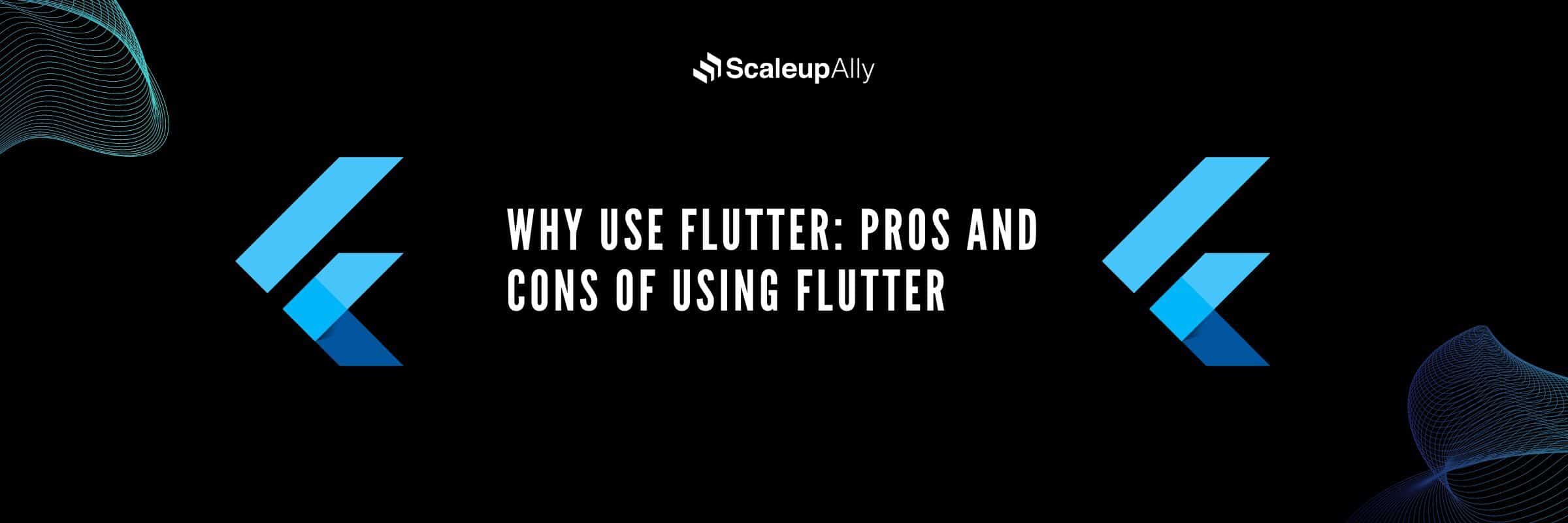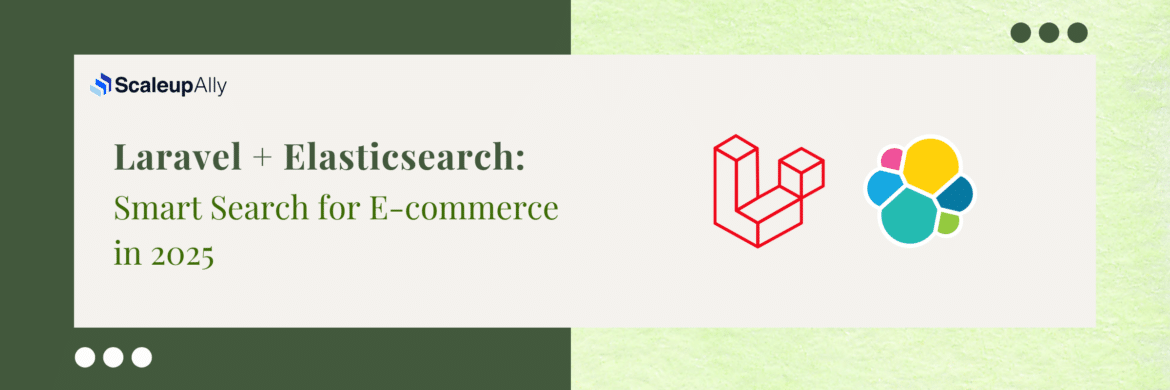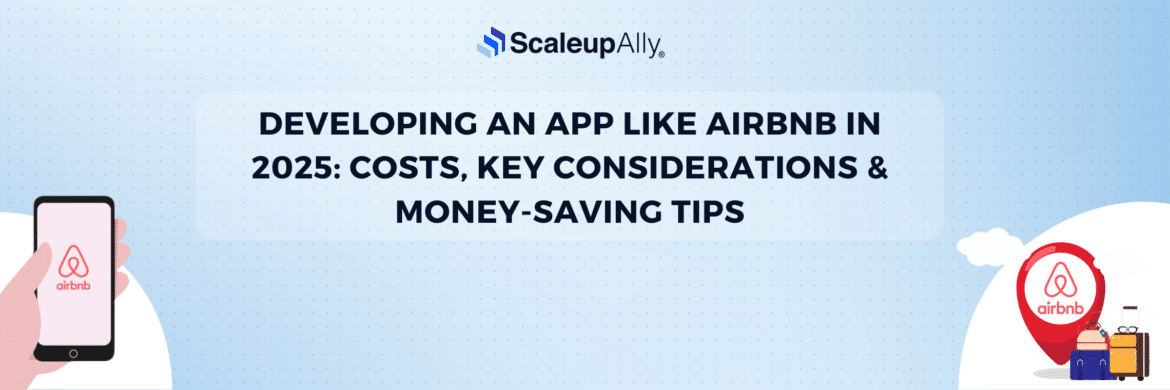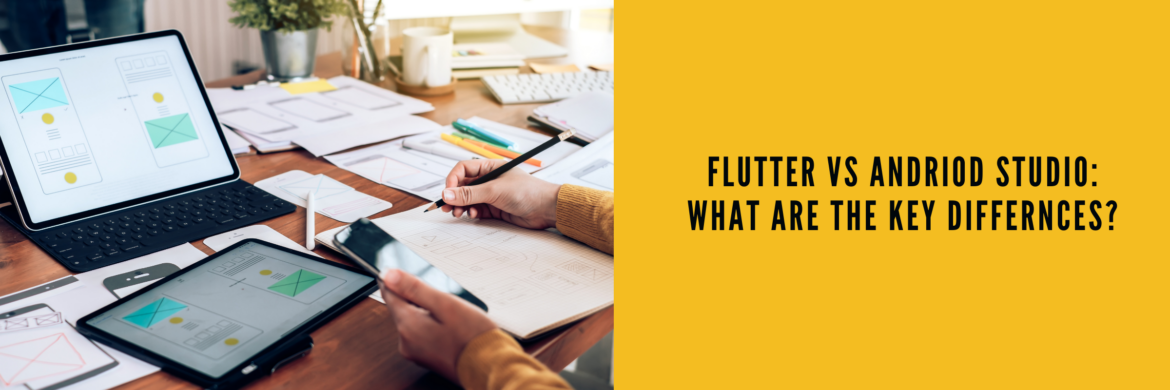
Why Use Flutter: Pros and Cons of Using Flutter
Suprabhat Sen | August 27, 2024 , 13 min read
Table Of Content
Flutter, like a rising star in the ever-shifting galaxy of cross-platform app development, has firmly established itself as a dominant player. It offers a range of features that make it a compelling choice for developers.
But before jumping on the Flutter bandwagon, it’s essential to understand its pros and cons.
In this article, we explore why Flutter has gained popularity and the potential benefits it brings to app development. We’ll also delve into the challenges and limitations that developers may encounter when using Flutter.
By weighing the pros and cons of Flutter, you’ll be equipped with valuable insights to make an informed decision on whether Flutter is the right choice for your project or not.
Join us as we analyse the strengths and weaknesses of Flutter.
Pros and Cons of Using Flutter: An Overview
| Pros of Flutter | Cons of Flutter |
|---|---|
| Cost and Time Savings | Heavy Native Integration |
| Single Codebase for Multiple Platforms | Limited for Highly Complex Apps |
| Rapid Development with Hot Reload | Existing Native Codebase Integration Challenges |
| Free and Easy to Use with Strong Community Support | Performance Issues for Platform-Specific Requirements |
| Rich Set of Pre-Designed Widgets | Learning Curve for Dart Language |
| Flexible Integration with Native Code | May Not Fully Leverage Native Capabilities |
| Ideal for Limited Resources Development | |
| Extensive Libraries |
What is Flutter?
Flutter is an open-source UI software development kit made by Google to help build natively compiled apps for mobile, web, and desktop using a single codebase. Flutter runs on Dart programming language and offers a rich set of pre-designed widgets for fast and visually attractive app development.
What is Flutter used for?
The advantages and disadvantages of Flutter are plentyful but it truly shines when developing cross-platform apps featuring a unified UI. Its use generally ensures the establishment of consistent appearance, performance, and responsiveness of apps across various devices and operating systems.
Advantages of Flutter
There are many advantages of Flutter as a cross platform mobile development framework, including the ability to create web applications that have a native look and feel on both Android and iOS devices, reduced development time and costs, and increased flexibility.
- Flutter is fast: It uses a Dart programming language compiled into native code, meaning there is no need for a JavaScript bridge. This results in apps that are fast and responsive.
- Flutter is free: There are no licensing fees or charges for Flutter app development. This makes it an attractive option for startups and developers who want to create high-quality apps without spending much money.
- Different screen adaptability: Flutter applications can be designed to work on various screen sizes and aspect ratios. This makes it easy to create apps that look great on both phones and tablets.
- Flutter Makes Users Fall in Love with App’s UI: It allows building beautiful UI with the help of built-in design-centric widgets (you can also customize them or create your own), Cupertino widgets (for Apple’s app look), Material Design widgets (for Android’s app look), various mobile app development tools, easy scrolling, innovative APIs and navigation features.
- Fast and Dynamic Code Writing: With the famous hot-reload feature, developers can see the alterations made in the code straight away in the application. Imagine, you found a bug while using an app. With Flutter you can fix it immediately without restarting everything. It won’t take you even a second to see what has changed, which makes mobile app development fast and allows experimenting with new features. Create, test, improve! Just within several minutes, you can check out how your app looks.
- Better Performing with the Dart, Skia, and DevTool: Flutter’s performance is often questioned because of its cross-platform nature, but it really matches single-platform frameworks. Traditional Android apps use Java code and Skia graphics engine for rendering, while cross-platform frameworks use an abstraction layer that can result in significant overhead.
- Publicly Accessible: Flutter, as an open-source framework, offers a window into the development process, allowing for easy access to the original codebase for your project. With a thriving and supportive community, you can tap into the necessary assistance to build your app and give back to the community by sharing your expertise and reporting bugs.
- Simple platform: Flutter provides advanced OS features like GPS coordinates, sensor data collection, permission handling, Bluetooth, credentials, and other features in ready-to-use plugins that are supported by Google.
Also Read: Cost of developing a Flutter app
Disadvantages of Using Flutter
The Dart programming language used by Flutter can be challenging for some developers, and there may be a steep learning curve for those who are not already familiar with it.
Here are a few disadvantages of using Flutter:
- Limited plugins/packages: Compared to React Native, Flutter has a limited number of plugins and packages. The impact of this limitation should be lessened over time as the community builds more plugins and packages for Flutter. As of right now, there are more than 26K packages available to facilitate the creation of Flutter apps, and the number is continuously growing.
- Not as many third-party libraries: While Flutter does have a rich set of widgets, there is still a lack of third-party libraries. Libraries are essential for adding app features and functionality, so this must be considered when using Flutter.
- Tooling is not yet as good as other platforms: The tooling for Flutter (the tools developers use to create apps) is not yet as mature or robust as other platforms, such as Swift on Xcode.
- Dart is not a widely-used programming language: Dart is relatively new compared to mature languages like Java. This means there may be a limited number of developers who are familiar with it and able to work with it.
- Bigger app size: With built-in widgets, Flutter apps tend to be larger than those built with other frameworks. This can be an issue if you are developing for a platform with limited storage space.
- Issue with iOS: Flutter is developed by Google. This is why developers are worried about its implementation for iOS. Since Google is directly interested in fixing bugs in the shortest amount of time, building Android apps on Flutter is fast and enjoyable. One of the latest updates in Flutter is a pixel-perfect iOS appearance. iPhone settings were created on the framework to enable the Cupertino widgets. But based on iOS 10 and iOS 11, features were updated later and released for a while.
- Prescriptive Tooling: Due to the comprehensive nature of Flutter and its associated tools, the technology can feel somewhat restrictive to developers more used to assembling projects from the many available frameworks and libraries out there.
Also Read: Best Flutter App Development Companies
Why use Flutter?
Using Flutter for your app development endeavours offers a multitude of advantages. Its ability to create beautiful, natively compiled applications for various platforms from a single codebase is just the beginning.
Beyond its robust performance and impressive widget library, Flutter has a vibrant and collaborative developer community, ensuring continuous growth and support.
Whether you’re a startup striving for rapid development or an enterprise seeking a cost-effective cross-platform solution, Flutter is an attractive choice for app development because of its flexibility and ability to bring new and exciting features to your app development journey.
Here are the reason why you should use Flutter for your next project:
- Single Codebase for Multiple Platforms: Flutter allows you to write a single codebase that runs on both iOS and Android platforms. This significantly reduces development time and effort as compared to building separate native apps for each platform.
- Hot Reload: One of Flutter’s standout features is hot reload. Developers can make changes to the code and see the results almost instantly in the running app. This speeds up the development and debugging process, making it highly productive.
- Performance: Flutter’s architecture is designed for high performance. It compiles to native ARM code, and its rendering engine is optimised for smooth animations and fluid user interfaces.
- Growing Community: Flutter is appreciated for its easy-to-follow documentation and friendly developer community. Ever since its debut, the Flutter developer community is growing continuously with an increase in its number of programmers.
- Dart: Developers’ reason to choose Flutter is because of the Dart programming language Flutter is based on. The features that make it stand out from other languages are:
- Ahead Of Time (AOT) compiler which makes Flutter Widgets customizable and a quick startup possible.
- Just In Time (JIT) compiler, since it makes it possible to optimise a code while it is running.
- Material Design and Cupertino widgets: Flutter provides out-of-the-box support for both Material Design (Android) and Cupertino (iOS) widget sets. This ensures that the UI looks native on both platforms, creating a consistent and familiar user experience.
- Support for web and desktop: Flutter has extended its support beyond mobile platforms and now includes web and desktop platforms as well. This means developers can use Flutter to build applications that run in web browsers and on desktop operating systems like Windows, macOS, and Linux, in addition to Android and iOS. This multi-platform support allows for code reuse and a consistent development experience across a wide range of devices and platforms.
Also Read: Flutter vs Flutter Flow: What to choose?
When to use Flutter?
Flutter emerges as the optimal solution for app development when your project doesn’t require intricate integration with native elements or hardware, and you’re keen on streamlining both cost and development time. With Flutter in your toolkit, you can craft a diverse range of applications like Healthcare apps, Ecommerce and retail apps, Travel and booking apps and On-demand apps etc.
Let’s explore a selection of scenarios where opting for Flutter can be the optimal decision for your app development:
- Startups: Flutter is a good choice for startups because it is free and easy to use. It also has good tooling and libraries, so you can create a high-quality app without spending much money.
- Businesses with limited resources: Flutter is a good option if you have limited resources, such as time or money. This is because it doesn’t require as much time or money to develop an app.
- Quick MVP Development: Flutter excels in rapid development scenarios, making it an excellent choice for building Minimum Viable Products (MVPs) and simple mobile apps. Its hot reload feature and single-codebase approach enable faster development, reducing time-to-market and development costs.
- Cost and Time Savings for Cross-Platform Apps: When you aim to target multiple mobile platforms (iOS and Android), Flutter can lead to significant cost and time savings. Instead of building separate native apps, you can use a single codebase to develop for both platforms, which streamlines development efforts.
- Native Code Integration: While Flutter allows you to create cross-platform apps, it’s also flexible enough to incorporate native code when necessary. This can be beneficial when you have specific platform-dependent requirements or need to leverage native APIs or features.
- Complexity and Development Time: If your app requires complex platform-specific integrations or a high level of native code, the development time and cost savings of Flutter may be less pronounced. In such cases, you may spend more time on platform-specific development.
When should you not use Flutter?
Despite its usefulness, the alternatives of Flutter are an ideal pick in certain conditions. Let’s examine a few scenarios when not opting for Flutter for app development is the right decision:
- Critical Native Integrations: Due to certain flutter limitations, app development needing extensive integrations with native hardware or components will increase project complexities.
- Existing Codebase: When the native app has a fully functional codebase, migrating it to Flutter isn’t practical or cost-efficient.
- Complex Optimization: Matching or offering platform-specific features with optimal performance requirements is less efficient with flutter for complex or intricate apps.
- Native Experienced Team: Any large team with expertise in native development can easily leverage their skills for app development better in comparison to transitioning to Flutter.
What are some popular apps built on Flutter?
Popular Apps Built on Flutter have not only gained immense popularity but have also redefined the mobile app landscape. Flutter’s versatility and efficiency in creating stunning cross-platform applications have caught the attention of both developers and users alike.
From sleek e-commerce platforms to engaging social media interfaces, these apps showcase Flutter’s capability to deliver seamless performance and a visually appealing user experience.
Here are some popular apps that are built on Flutter:
- Alibaba: The Alibaba Group, one of the world’s largest e-commerce companies, adopted Flutter for building parts of their Xianyu app, which is a secondhand shopping platform.
- Google Ads: Google used Flutter to develop the Google Ads app, which allows users to manage their Google Ads campaigns on the go.
- Tencent: Tencent, the Chinese tech giant, has utilised Flutter in some of its applications. Flutter was used for the development of Tencent Now News app, among others.
- Reflectly: Reflectly is a popular journaling app that uses Flutter for its development. It offers a clean and intuitive user interface for journaling and self-reflection
- Hamilton Musical: The official app for the Hamilton musical, developed by Disney, was built using Flutter. It provides fans with interactive content and behind-the-scenes features related to the Broadway show.
- eBay Motors: eBay Motors, a subsidiary of eBay focused on automotive sales, has employed Flutter in its app to provide users with a smooth shopping experience for auto parts and vehicles.
- Abbey Road Studios: The famous music recording studio, Abbey Road Studios, used Flutter to build its Topline app, which helps musicians capture and sketch their song ideas.
- Hookle: Hookle is a social media management app that allows small businesses to manage their social media accounts easily. This app too is developed using Flutter.
- PostMuse: PostMuse is a creative tool for social media content creators. It provides templates and design tools for creating engaging social media posts and stories, and it’s built with Flutter.
- Realtor.com: Realtor.com, a popular real estate listing platform, has employed Flutter for parts of its mobile app to provide users with a seamless property search experience.
Conclusion
Flutter indeed stands out as an exceptional framework for cross-platform mobile application development. Its commitment to platform independence simplifies the development process, enabling developers to create high-performance, feature-rich apps with ease.
Flutter’s strength lies in its ability to deliver a consistent and compelling user interface across Android and iOS, making it accessible to a wide range of developers.
With its emphasis on simplicity, performance, and feature versatility, Flutter is poised to empower a new generation of developers to craft cutting-edge mobile applications that cater to the evolving demands of the industry.
Frequently Asked Questions
Q: What is Flutter?
Flutter is an open-source UI framework created by Google for building natively compiled applications for mobile, web, and desktop from a single codebase.
Q: Which programming language does Flutter use?
Flutter uses the Dart programming language, which is also developed by Google.
Q: Is Flutter free to use?
Yes, Flutter is free and open-source, released under the BSD licence.
Q: What platforms can I target with Flutter?
Flutter allows you to build apps for iOS, Android, web, desktop (Windows, macOS, Linux), and more.
Q: What are the key benefits of Flutter?
Key benefits of flutter include hot reload for fast development, a rich set of customizable widgets, cross-platform development, a growing ecosystem of packages, and a strong community.
Related Blogs

Laravel + Elasticsearch: Smart Search for E-commerce in 2025
Learn how to integrate Elasticsearch with Laravel, from setup and configuration to indexing. Improve your app's search performance using Laravel Elasticsearch.
ScaleupAlly Team
Jul 3 ,
15 min read

Developing an App Like Airbnb in 2025: Costs, Key Considerations & Money-Saving Tips
Discover the cost to build an app like Airbnb, key factors, app types, and smart ways to optimize development expenses for better ROI.
Suprabhat Sen
Jun 29 ,
10 min read

Flutter vs Android Studio: What are the Key Differences?
Flutter vs Android Studio: Wondering which technology to choose to build your next app. Here is a detailed guide that will help you make a decision.
Suprabhat Sen
Jun 28 ,
14 min read








